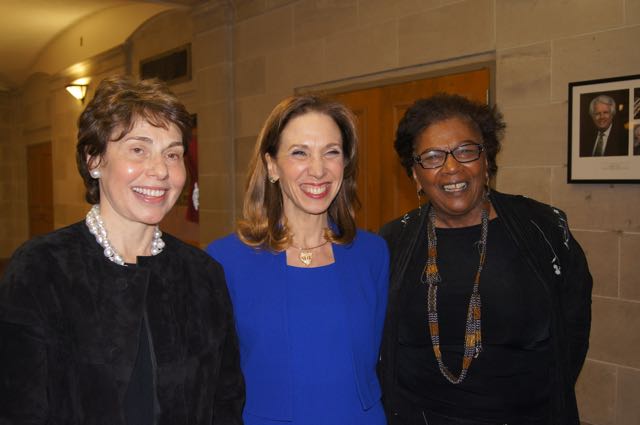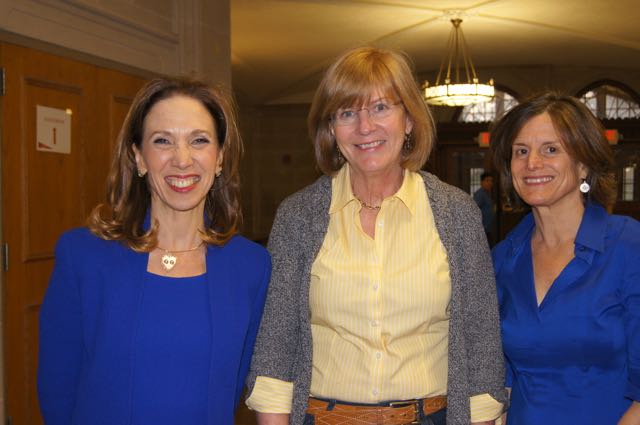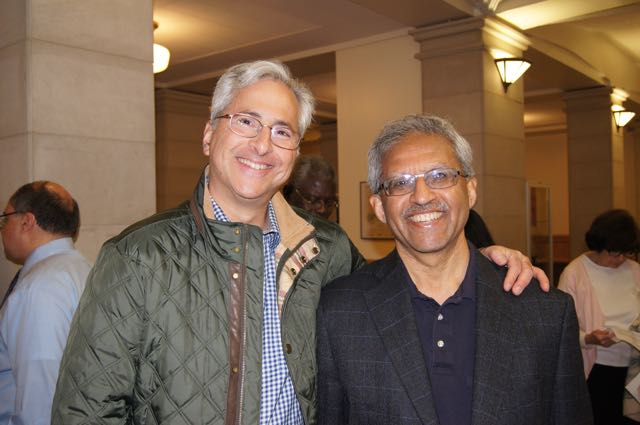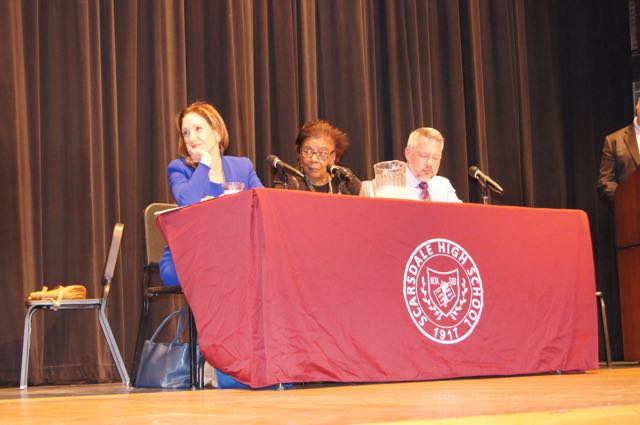Regent Judith Johnson Calls For Reconsideration of New Teacher Evaluation System
- Category: Schools
- Published: Sunday, 03 May 2015 21:49
- Joanne Wallenstein
 Though the crowd came to Scarsdale High School on April 30 to hear what NYS Regents Chancellor Merryl Tisch had to say about student testing and teacher evaluations, newly appointed regent Judith Johnson emerged as the local hero that night. In the week leading up to the Scarsdale Forum Panel that promised to bring together Scarsdale Schools Superintendent Thomas Hagerman, State Assemblywoman Amy Paulin and Tisch, the Chancellor cancelled her appearance and said she would be in the audience. In her place, she sent Johnson who had just been appointed as a Regent representing the lower Hudson Valley.
Though the crowd came to Scarsdale High School on April 30 to hear what NYS Regents Chancellor Merryl Tisch had to say about student testing and teacher evaluations, newly appointed regent Judith Johnson emerged as the local hero that night. In the week leading up to the Scarsdale Forum Panel that promised to bring together Scarsdale Schools Superintendent Thomas Hagerman, State Assemblywoman Amy Paulin and Tisch, the Chancellor cancelled her appearance and said she would be in the audience. In her place, she sent Johnson who had just been appointed as a Regent representing the lower Hudson Valley.
The panel drew an audience of educators and parents from Scarsdale, surrounding towns, northern Westchester and Rockland County who are concerned about state mandated tests and legislation that orders the Regents to design a system that closely ties teacher evaluations to their students' performance on state tests and observations from evaluators outside the school. Passed with the NYS budget, the new laws extend the probationary time before teachers can be granted tenure to four years, makes test results 50% of a teacher's evaluation score, calls for someone from outside the school to observe and measure teachers and further minimizes the influence of local administrators on teacher evaluations. Though there is a popular movement to opt students out of the lengthy state tests, there could be possible sanctions if less than 95% of students take the test.
According to State Assemblywoman Amy Paulin, these measures were implemented under pressure from Governor Cuomo who packaged them with a state budget that promised increased aid for schools to coincide with these tough new regulations.
As it stands now, the NYS Education Department and the Regents are charged with formulating the new  teacher evaluation system by June 30th, then school districts would need to re-open their contracts with teachers this summer and have the new system in place by November 15, 2015.
teacher evaluation system by June 30th, then school districts would need to re-open their contracts with teachers this summer and have the new system in place by November 15, 2015.
The new law has few fans. It has angered parents, teachers and school administrators and prompted a backlash against Governor Cuomo, Chancellor Tisch and the state department of education. As Johnson said on the panel, this is the "third proposed change to the teacher evaluation system in just four years," and it has caused an uproar at all levels.
Before the panel discussion began, Tisch arrived and gave an interview to local journalists. She hinted that the Regents might use their discretion to soften the impact of the law saying, "We need to find a way to give school districts a way to have a voice and tailor teacher evaluations themselves....The State Education Department has been asked to write the regulations around the law. In the end we will find a way to allow districts some leeway." She also suggested that the deadlines for implementation could be relaxed, saying, "If you (the district) can show you are bargaining in good faith you can have the evaluation system in place by September 2016." Seeking to distance herself from the Governor she said, "We did not write this law. It is being examined and we are looking for the greatest flexibility and variability to make it workable." However, it should be noted that in a December 30, 2014 letter from Tisch to Cuomo she outlined ideas for changes to the tenure process and for firing teachers that later became part of the law.
She also cautioned, "Federal law requires testing in grade 3-8 as well as reporting test results." She said, "There are 699 districts and we can't have 699 systems."
 After introductory remarks from Scarsdale Forum President and recognition of retiring Scarsdale Village Manager Al Gatta, the panel discussion began. Superintendent Hagerman provided a look back on the genesis of the Common Core curriculum. He explained that the "Common Core was designed to develop benchmarks and standards ....in the beginning it focused on positive outcomes and was seen as an effective building block. The Common Core was embraced as a cure all."
After introductory remarks from Scarsdale Forum President and recognition of retiring Scarsdale Village Manager Al Gatta, the panel discussion began. Superintendent Hagerman provided a look back on the genesis of the Common Core curriculum. He explained that the "Common Core was designed to develop benchmarks and standards ....in the beginning it focused on positive outcomes and was seen as an effective building block. The Common Core was embraced as a cure all."
However, forcing a proscribed curriculum on teachers and students proved to have shortcomings. Hagerman said, "The Common Core values analytical skills rather than personal interaction. It does not recognize how students learn...Learning requires a social context. Students want to know why something is relevant to them. Emotions and memories are intertwined. When we try to teach reading in isolation as an analytical skill we lose the passion in learning."
About the new regulations he said, "Administrators, teacher and parents are just plain angry. We are left to navigate nearly impossible waters and to find solutions where few options exist.... What we are doing currently is not working. The blame cannot be on the backs of our teachers and our children.... The work of public education must be returned to local communities and to teachers who can make the best decisions for children in their care."
Johnson took the microphone and explained that she had "only been on the Board of Regents for 30 days." She looked back on the evolution of the standards and recalled Scarsdale Schools Superintendent Tom Sobel with whom she worked in 1990 on a curriculum of project and enquiry-based learning. However they found that they were not able to successfully develop valid tests to measure the skills emphasized in the program. She is now calling for research to define intended outcomes for education. Saying we are now creating "test-ready" students, she said unless we "give students a moral code, imagination, the ability to appreciate the magic of life, our approach to the standards will have failed." About the tests she said, "Assessments must include multiple measures, must include problem solving and critical thinking."
 She also called for the inclusion of the arts in the curriculum and told the group that when she was in school she given the chance to learn to dance. She said, "The arts are a suite of tools for human expression that are independent of a native language. Arts are an essential component of education and we need to put the arts back on the table."
She also called for the inclusion of the arts in the curriculum and told the group that when she was in school she given the chance to learn to dance. She said, "The arts are a suite of tools for human expression that are independent of a native language. Arts are an essential component of education and we need to put the arts back on the table."
Turning to the subject of teacher evaluations, Johnson said, "Districts should be given the flexibility to attract and maintain successful teachers. There is a crisis in recruiting and retaining teachers who will be measured by a single score in a three-hour period. We need to start with a positive premise for professional growth. I think we should suspend the notion of using test scores to quantify teachers until we have a better sense of what that means. What is the point of shaming or humiliating teachers? It is not likely that anyone will be a better teacher because of his/her rating. The failure to embrace teaching as a profession is just shameful."
Taking it one step further than Chancellor Tisch, Johnson called for the Regents to delay implementation of a new system. "Given the controversy it is time for a pause. We need time to evaluate our efforts. The first step to solving a problem is to recognize we have one. What we have put in place looks like no other educational system on the planet. What is it we want our students to know and do?"
With that, the entire auditorium rose and gave Johnson a standing ovation. The applause continued for many minutes while the group acknowledged they had a champion for their cause in the newly appointed regent.
Paulin reviewed her efforts to counter state testing and state mandated teacher evaluations systems. She said that the tests are "not a valid measure of whether students will succeed in college or in a career," and that the new APPR "sets teachers, principals and districts up for failure and is a poorly designed teacher evaluation system that needs to be re-written."
Why was the new law passed? Paulin explained that the "Governor said unless this was adopted, school districts would not receive any additional state aid."
Applauding Johnson, Paulin said, "The issues are complex. That's why I am so pleased with the appointment of Judith Johnson. We got the best. Her clarity on the issues is astounding. She will be a voice for effective reform."
Paulin also called for "Flexibility on the November 15 deadline for teacher evaluations and for pushing the new system out to September 2016."
In the Q and A session, former School Board member Jonathan Lewis asked the panel if they believed we needed more oversight in place, to which Johnson replied, "The State Education Department is severely understaffed. If the Governor wants an outstanding education system, staff the education department."
Jason Copeland, a Scarsdale resident who teaches in the Bronx, explained that evaluating teachers based on test results would cause good teachers to leave districts where they are most needed. He said, "Teachers will want to work in areas with less variability. The APPR will make good teachers avoid kids in need. You will have issues every year."
Diane Greenwald asked how local parents could participate in the policy discussions and Johnson advised her to "Focus on meaningful options. Clearly state your intended outcomes. Be very clear in what you want to accomplish." She said, "We listen to the collective voices of citizens. The very fact that we are here today suggests that you are being heard."
Reacting to the evening program, one parent in the audience called Johnson "smart, knowledgeable, experienced and incredibly candid." She added, "I hope she has the stamina to deal with this issue because it's very complicated and it's going to take a long time to get this right."







